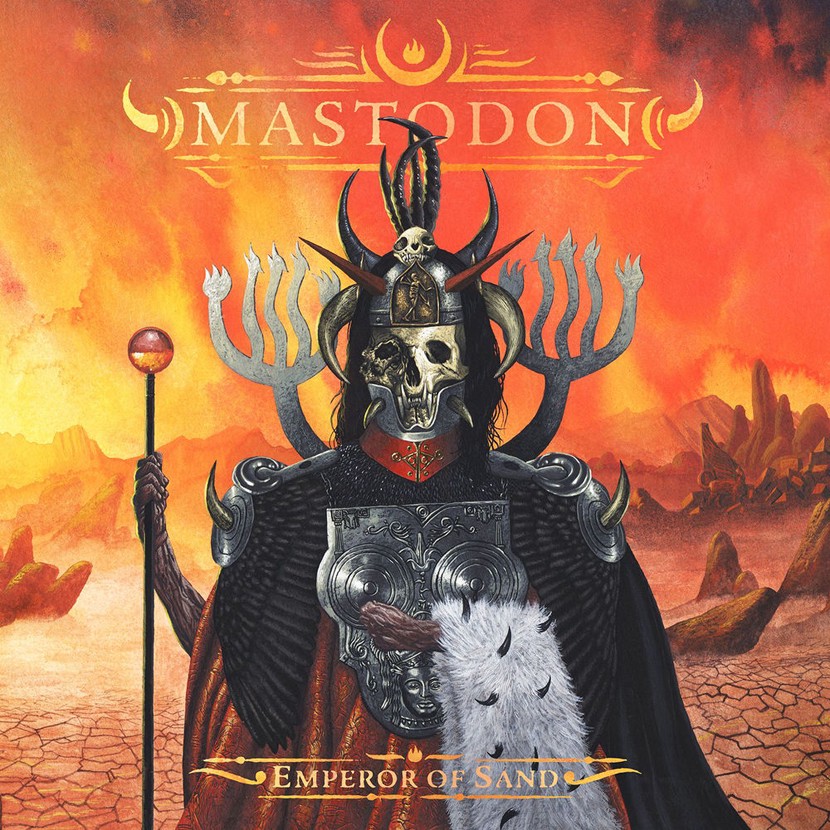The Very Model Of A Modern Major Metal Band
Mastodon’s ‘Emperor of Sand’ is a mature take on prog-rock.

“The reason that critics like Elvis Costello… is ’cause they all look like Elvis Costello.” —David Lee Roth
Since their formation in 2000, no band has contributed more to the heavy-metal canon than Atlanta, Georgia’s Mastodon. The four-piece prog-metal giant’s catalog has covered land, sea, air, and space, taking them everywhere from the Grammys to Westeros. Over nearly 20 years and six albums, they’ve pushed the boundaries of what a metal band is “allowed” to be, crossing over into the rock charts while playing circles around the average rock band. They’ve made brutal standalone tracks and bonkers opuses, but for their seventh album they’re turning over the hourglass to ponder mortality and time (naturally, it’s called Emperor of Sand). Whether you’re an “I prefer the early stuff” dickhead or living vicariously through them in your mom’s basement, a new Mastodon release is an event to circle on the calendar.
Emperor of Sand is a return to the concept album for Mastodon, but it’s not a return to the free-form, progressive fearlessness of 2006’s Blood Mountain or 2009’s Crack the Skye. While those albums are easily identifiable as the band’s artistic high water mark, Emperor is Mastodon hitting a new kind of, uhhhh peak. The lineup is still the same four dudes: Brann Dailor on drums, Brent Hinds and Bill Kelliher on guitar and Troy Sanders on bass. Vocals are done by committee, their distinct personalities and sounds coming together as only two decades of commingled odors in a tour van can bring. No one is fighting for space, each fulfills his role and executes it with style and skill that few can pull off while still serving a song.
Stephen King’s “Dark Tower” epic begins with a perfect first sentence: “The man in black fled across the desert and the gunslinger followed.” Similarly, Emperor of Sand begins with “Sultan’s Curse,” the story of a man sentenced to death and doomed to the desert, ‘Tired and lost, no one to trust.’ It’s a rager that features all of the many voices of the band, goes through a few quick movements and gets the fuck out. “Show Yourself” is a brief, near-pop respite from the gloom that will run throughout, with Dailor raising the bar on what a drummer can do while singing (or is it what a singer can do while drumming?) “Precious Stones” features the often criticized vocals of guitar wiz Hinds, whose voice actually complements the band’s less metal/more rock proclivities perfectly, while bringing to mind the best of the ’90s yowlers like Alice In Chains (before the style was reduced to a total joke by mouth-breathing buttrockers with awful band names like Seether, Staind and Shinedown).
At the middlish point of the album is “Roots Remain,” which would fit right in on some of their earlier records if not for Dailor’s ability to sing so well. The back half of the song is a multi-part changeup of a bridge, highlighted by a gonzo Hinds guitar solo at the 4:54 mark that reminds us that, yes, he’s capable of hitting a shitload of different notes in a row like any player who practices enough can, but he also knows how to make them fucking matter. It’s as heartfelt and meaningful a guitar part as you’ll find on any record these days. “Andromeda” is built around an unsettling, dissonant riff that brings to mind the influential ’90s New York hardcore legends, Vision of Disorder, with Troy Sanders’s signature guttural wail that resolves into a beauty of a chorus. It’s the highlight of a damn strong side two that carries the record home.
Featured on every part of every song is this band’s sheer ability to play the fuck out of their instruments. If you don’t know what the four of them look like, you might get the impression that they have more arms than most people. Listen closely, the progressive sensibility is still in there, it’s just folded into a standard verse-chorus, verse-chorus package. Each song is built like most good heavy metal, with a great riff at the foundation — Kelliher and Hinds seem able to mass produce these things in their sleep. Where 2014’s Once More ‘Round the Sun felt overwrought, leaving the listener wondering if there was enough gas in the tank for any more trips, Emperor feels free of fat and to the point, with enough adventurism to keep the prog prefix intact.
A welcome return on Emperor is Brendan O’Brien, the producer who quietly shaped much of the sound of the ’90s (and beyond) and made Crack the Skye Mastodon’s best-sounding record. Without O’Brien, 2011’s The Hunter veered a little too close to the over-processed, rigid production that makes so much metal unpalatable these days; the lack of atmosphere was a detriment to the high quality of the songwriting. Emperor of Sand’s production keeps a foot in the past with analog warmth (I’m willing to bet he uses tape machines) and values the sound of human beings playing instruments in a room.
While their days of blowing the doors off genres and rules might be behind them, Mastodon is still a vital animal, creating intelligent music in a heavy-metal landscape that often rewards the most stupid. Only one metal band has achieved more and left a greater impression on rock music history. Of course I mean Metallica, and of course at this point Metallica, try as they might to restore their glory, have made far more terrible records than good. Considering that, there’s a case to be made for Mastodon as the greatest metal band of all time.
Emperor of Sand is out now. Catch Mastodon on tour with Eagles of Death Metal & Russian Circles.
John Dziuban is no longer a musician, and he does not look like Elvis Costello. Metal Minutiae is an occasional column on the decline of rock music.
